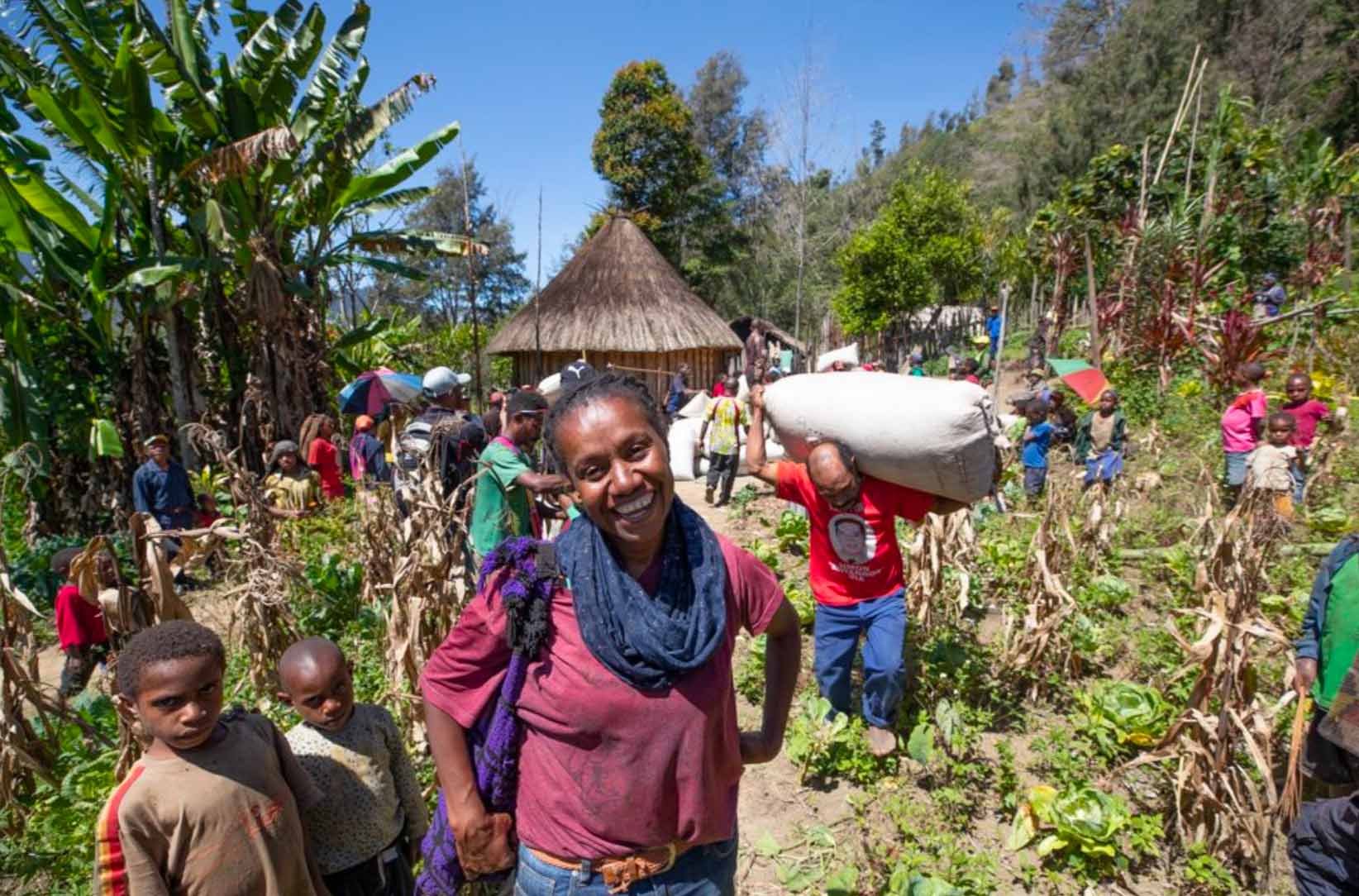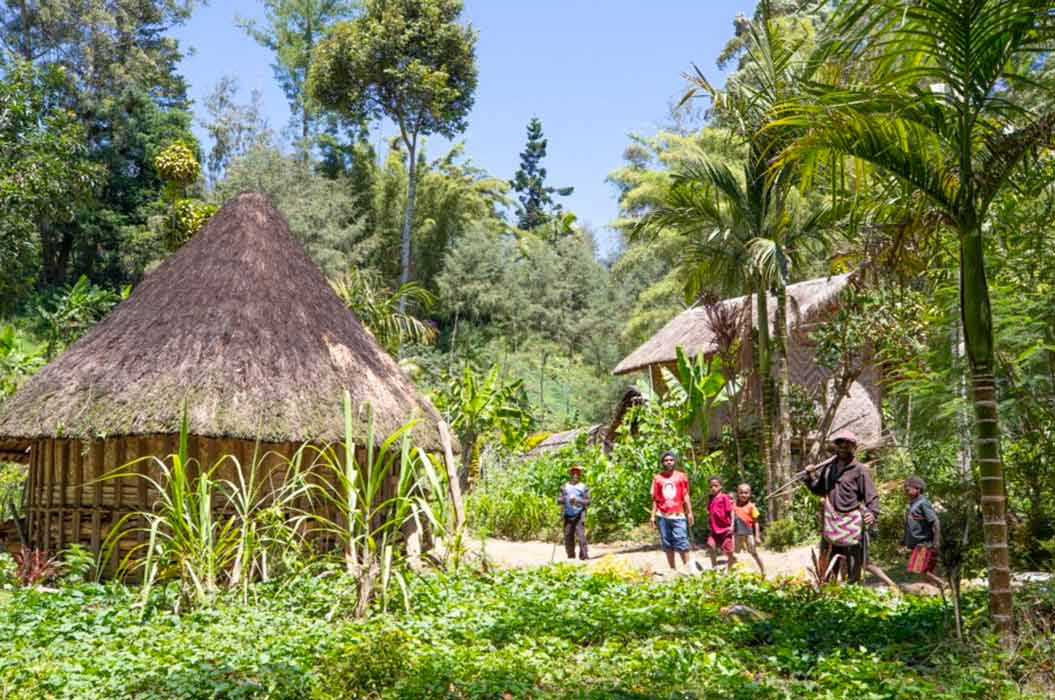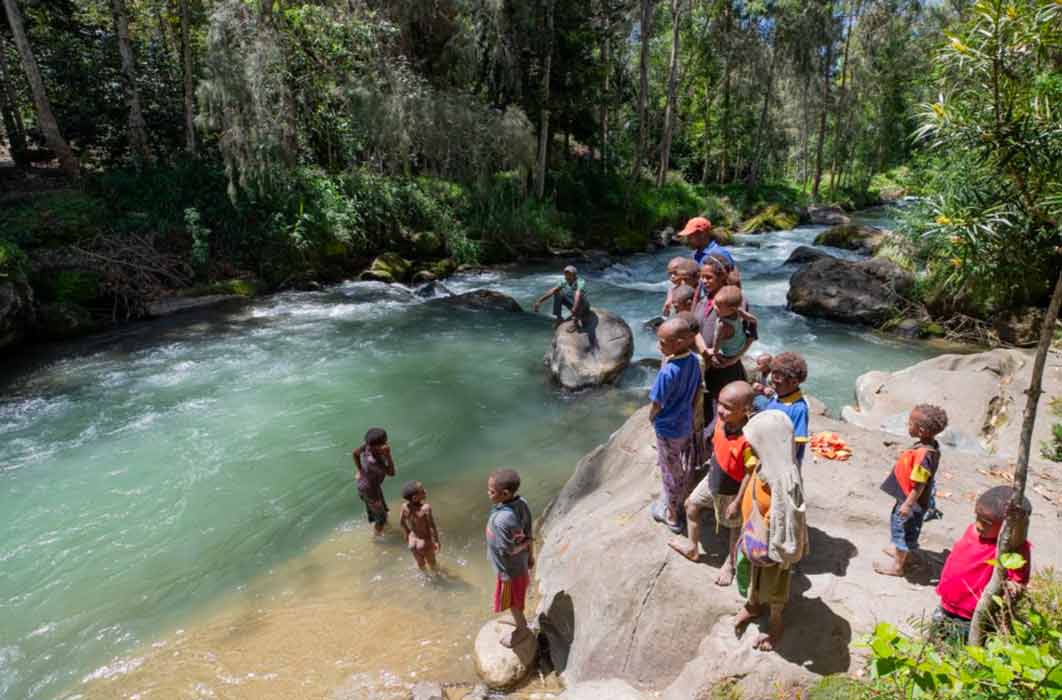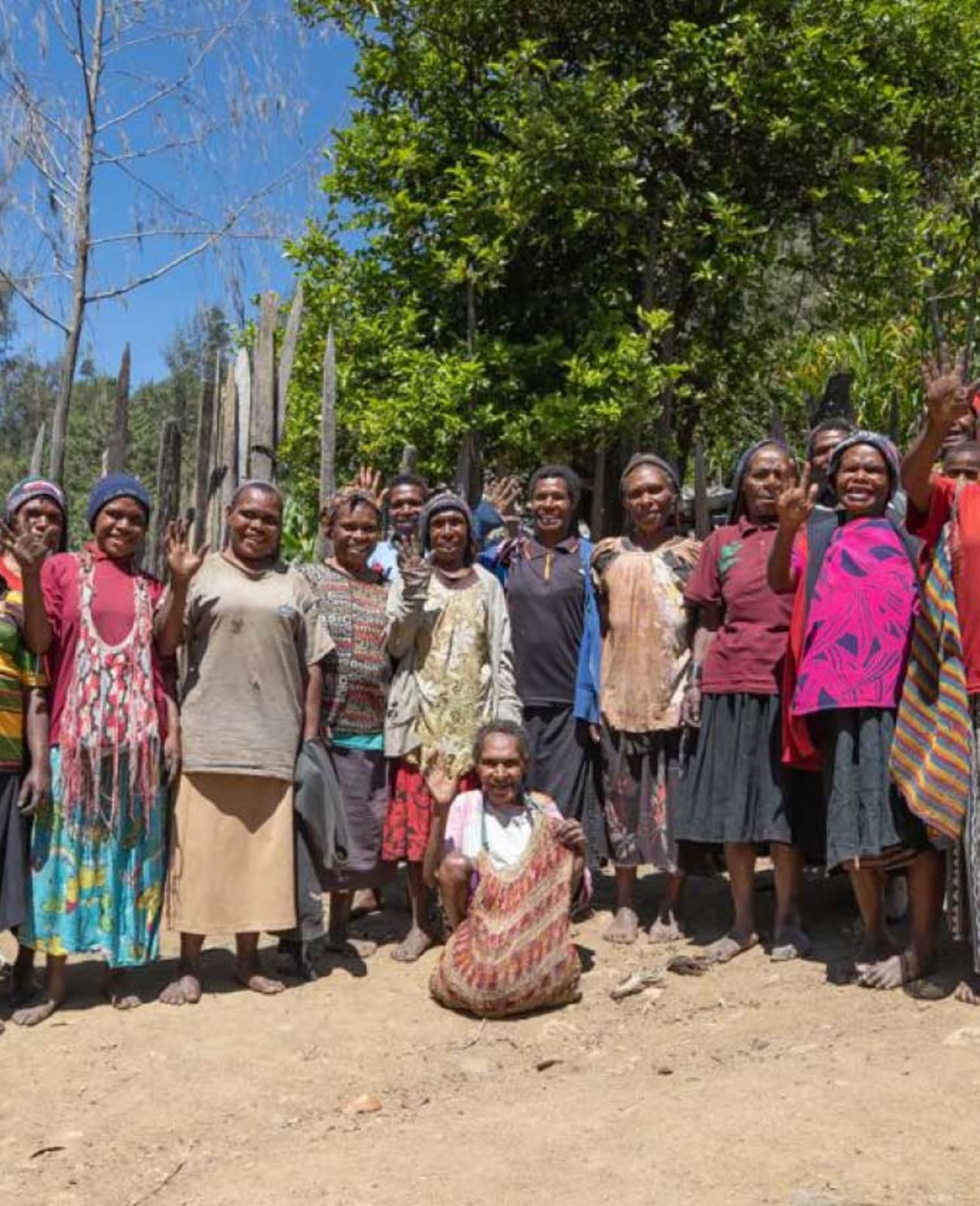The female smallholder group which produced this coffee is made up of thirty member-farmers. They’re located in the remote Marawaka area; a substation in the Obura Wonenara district, in the Eastern Highlands Province of Papua New Guinea.
What’s unusual here is that there’s no road connection into this area and this means coffee has to be carried out bag by bag, a three-day hike through bush trails and mountain tracks. The only other option is by airlift on chartered aircrafts.
The challenge they face is obvious: limited access to the coffee market due to transportation challenges. Most coffee buyers skip Marawaka because the area is only accessible by air and due to the effort and cost of bringing coffee out.
This has restricted much development and limited the cash economy in the area. Despite all the odds stacked against them, this group of female coffee growers work together in an effort to improve their livelihoods.

Priscilla Manove Source: Condesa/SMS-PNG
The profile of this coffee has been raised by Priscilla Manove, a young female entrepreneur who wants to see women play a more active and successful role in the coffee business. To do this she’s engaged with our partners SMS-PNG to explore options and opportunities.
With this amazing ‘first attempt’ in terms of quality, we’re confident that there’s a bright future ahead for this small group of ladies and their marketing and quality efforts are rewarded by SMS-PNG with premium price levels to support this group.

Marawaka village Source: Condesa/SMS-PNG
An adventure just to get there
How do you get to the Marawaka, you ask? Here’s how our sourcing parters at origin described it:
Head south-east from Goroka by car and keep going for 14 hours – it’s a serious 4x4 journey (and I’m talking serious “seat-belts are there to keep you in your seat”).
Leave the car in the middle of nowhere because the ‘road’ ceases to exist.
Shake your kidneys and slipped discs back in place because you are about to start an 18-hour hike over several mountain ranges.
That is where we find our proverbial pot of gold. A rainbow metaphor is well warranted considering the odd downpour you’d endure while hiking, followed by unrelenting sunshine.
This combination provides for an experience best described as climbing up a steep hill inside a steaming hot sauna while carrying a full backpack – albeit with a magnificent backdrop of primary rainforest.
Picture that next time you pay a dollar extra for a cup of coffee with a traceability story.
Was it worth it?
The hike brings you into a stunning grassland valley with a nice cool breeze, rivers and streams, hillsides covered with gardens and an amazing village community….oh, and coffee plots. Heaps of coffee plots.
We found the ladies that produced the lot of coffee that drew us here. We confirmed quantity and collected samples to confirm its quality once more. Of course we had to make sure the coffee will be available for us before we’d invest in chartering a plane to fly this coffee out. That is not a risk SMS nor Monpi could take without some guarantees or at least firm interest from a buyer.
This was after all just a risky exercise at this stage, a lucky find that may just be a fluke. But what if this would be a year-on-year success? How good would that story be! But who would be so mad to commit to buying this coffee based on just one sample and an excited Monpi quality team? We found just such a partner in Condesa. Kudos! Perhaps they just know the PNG specialty treasures are out there… Finally, in November SMS-PNG managed to get all stars aligned and found an aircraft a pilot and confirmed a date to fly us into Marawaka and pick up almost 4 tonnes of parchment. And yes, this meant we had to send someone out on foot again to ensure all coffee was ready to load at the village airstrip upon our arrival.
After landing on the small and bumpy grass airstrip of Marawaka (or was it the local rugby field?) you get an idea of what it must feel like as a Hollywood A-lister arriving at the Oscars, minus the red-carpet: an impressive crowd cheering and anticipating your arrival, with an escort of the entire community to where our pot of gold (70 bags of parchment) were stored. I have never seen bags of parchment being picked up and sprinted to the airstrip from a nearby storage shed so quickly.
Obviously there must have been a lot of excitement to see this coffee moving out of Marawaka and embark on an international coffee adventure making the village famous… That is my interpretation at least. Perhaps the anticipation of getting paid in cash for the first time this coffee season may have been a more plausible and solid motivator speeding up the loading process. Two days and four airlifts later, all parchment arrived in Goroka. After processing into green bean we had our first nervous cupping session… rapidly followed by another, and yet another. The latter just for fun (and to bring some roasted beans home for personal consumption) Yes, this was worth it. Expensive, but worth it.
With the amazing ‘first attempt’ in terms of quality, there is a bright future ahead for this small group of ladies. SMS-PNG has found an unbelievable story of passion and resilience that we wish to contribute to. Both in the form of premium price levels for the cooperative and to support logistical challenges. This beautiful product and this incredible coffee story deserve to reach the international coffee market. I am already looking forward to what can be produced in 2019.

Children play in a river near Marawaka Source: Condesa/SMS-PNG
An isolated community
Marawaka was one of the last places in Papua New Guinea that came into contact with the outside world in 1968.
Coffee was introduced to the area in the 1970’s by the Department of Agriculture and Livestock to encourage and create local economy for people. Since then, coffee had emerged to be the prominent cash crop because of the ideal climate and soil and had become the main topic of their conversations. Coffee brought money into this remote region and slowly pushed for development whilst government services continued to remain sparse.
Frustratingly, the decline of infrastructure in the country post-independence has affected the options for the Marawaka people to contribute to the coffee industry, despite amazing high altitude coffee gardens and fantastic coffee quality.
Processing at Marawaka
Coffee varieties of Typica and Arusha are grown in this area at an altitude between 1700- 2000 masl.
The process of coffee production is primarily viewed as a woman’s care towards her household and this is reflected in the quality of beans produced. The coffee cherries harvested are arduously processed through a primitive process by hand.
Small hand-pulpers are considered as unaffordable luxury: even if one had the means to purchase the machine; it would take considerable effort to carry into the area as a priority over other household needs. Therefore even today the same manual process of de-pulping coffee cherry applies.
After drying, the parchment coffee is stored in specially constructed bush material coffee houses whilst waiting for potential coffee buyers to enter the area.
Historically, the price fetched for crops from Marawaka are very low, to reflect the chartered air freight which needs to be factored in, and further road transport from Kainantu (the nearest airstrip) to Goroka. This has typically driven prices to be significantly lower than coffee grown closer to Goroka – something we’re proud to be a part of lifting by paying premium prices to reflect the passion and quality that’s gone into this amazing coffee.






